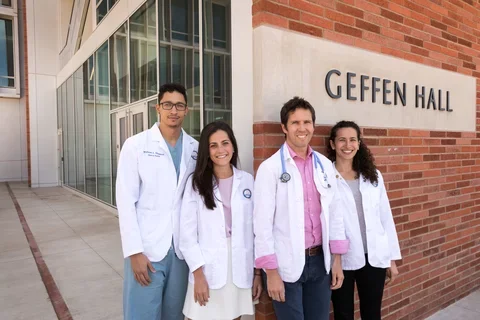First David Geffen Medical Scholarship students at UCLA are graduating

Graduating David Geffen Medical Scholarship recipients Caroline Gross and MacLean Sellars (center), flanked by fellow recipients William Sheppard Jr. and Orly Bell.
After earning a master’s degree in education and working as a public-school teacher in New York, Mariel Bailey decided to pursue a medical degree.
That concerned her parents in Rhode Island, who were unable to help cover the costs. Bailey had her pick of top medical schools, including UCLA, UC San Francisco, Harvard, and Stanford. An all-expenses-paid scholarship from the David Geffen School of Medicine at UCLA “essentially made the decision for me,” she said.
“The scholarship was a godsend that provided the financial freedom to pursue my dream at an amazing program debt-free and without having to repay years of loans,” Bailey said.
On June 2, Bailey will take the Hippocratic Oath with 177 other graduating medical students. Nine of them, including Bailey, are the first to complete their studies as recipients of David Geffen Medical Scholarships. The $100 million scholarship program — announced in 2012 and funded by entertainment executive and philanthropist David Geffen — is helping UCLA to recruit some of the nation’s best medical students, lifting the burden of debt and facilitating the pursuit of career paths aligned with their passions, including dual-degree programs and scholarly research.
So far, 127 students have received a David Geffen Medical Scholarship, which is based entirely on merit. School officials estimate that by 2022, a total of 300 scholarships will have been awarded — a figure equal to about 20 percent of each entering class during the 10-year period.
UCLA’s medical school was named for Geffen in recognition of a $200 million gift in 2002.
“The David Geffen Medical Scholarships are pivotal to our continued ascent as one of the nation’s premier medical schools — an ascent that’s remarkable because we’re the youngest of the top 10 medical schools,” said Dr. Kelsey Martin, dean of the David Geffen School of Medicine at UCLA. “In less than three-quarters of a century, discoveries made by our researchers have transformed the practice of medicine, and we have trained thousands of physicians, physician-scientists, and biomedical researchers who themselves have gone on to positively impact Los Angeles and other communities.”
UCLA’s new home for medical education, Geffen Hall — officially dedicated last month — was named in recognition of Mr. Geffen’s impact on the school, a national leader in research, patient care, medical education, and community service.
Like Bailey, Caroline Gross entertained offers from several top medical schools, including UCLA’s. She chose UCLA in part because of the David Geffen Medical Scholarships.
“I found a medical school that allowed me to become the best physician that I could be — a physician who values empathy and compassion as much as clinical acumen, and one who works better with others than alone,” said Gross, 26. “I’ve had an opportunity to explore my greatest passions in medicine, including ethics and the management of critically ill pediatric populations.”
Among other opportunities provided by the scholarship, Gross said it supported travel to Ghana, where she conducted research on the country’s education programs for neonatal resuscitation. After graduating, she will enter a pediatrics residency at Boston Children’s Hospital. Leaving UCLA without debt makes her more comfortable considering a primary care specialty, often less lucrative than other medical specialties.
Studies commissioned by the Association of American Medical Colleges have found that the numbers of new primary care physicians and doctors in certain specialties are not keeping pace with the demands of a growing and aging population. Feeding concerns about doctor shortages, the median debt of medical school graduates rose from $125,000 in 2000 to $190,000 in 2016, according to the AAMC.
Debt can influence what fields medical school graduates pursue and where they develop their professional careers. Reducing debt allows students to make career decisions based on their passions while reducing concerns about going into lower-paying specialties.
Seventy percent of this year’s UCLA medical school graduating class is staying in California for residency training — a figure consistent with prior years. The David Geffen Medical Scholarship recipients headed to out-of-state residencies expressed interest in returning to California at some point in their careers.
For MacLean Sellars, 35, a Glendale, California, father of 19-month-old twin boys, the scholarship provided family as well as professional benefits.
“Knowing that I’m leaving medical school with no debt makes it possible to entertain any career path I want without putting my family’s future at risk,” he said. “Mr. Geffen’s generosity not only made my family possible. He made my career with a family possible.”
Sellars, who entered medical school with a doctorate in molecular biology, leaves the day after graduation with his family for an internal medicine residency at Massachusetts General Hospital in Boston. His goal is a subspecialty in oncology, driven in part by an interest in research and his mother’s death from cancer.
Mostafa Al-Alusi, 26, also is headed to Mass General for an internal medicine residency. He wants to explore opportunities in medical technology as an entrepreneur.
“The scholarship enables me to earn my medical degree yet still have the financial security to consider starting a company or buying a house,” said Al-Alusi, who grew up in San Diego. “Not having to worry about debt after graduation is a huge weight off my shoulders.”
After graduating, Bailey, 30, will enter a combined internal medicine and pediatric residency at Brigham and Women’s Hospital and Boston Children’s Hospital. She said the debt-free education afforded by the scholarship provides the freedom to carve her preferred career path — return to California and practice internal medicine.
“I want to work on developing effective preventive care campaigns for children and adult populations,” Bailey said. “It won’t be as lucrative as other specialties, but it’s something that truly drives me.”



